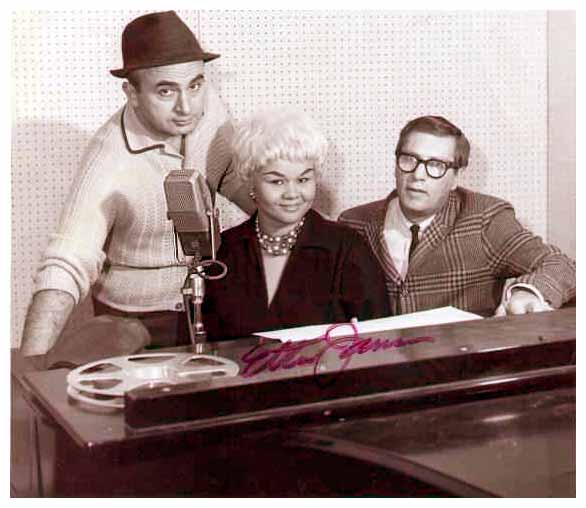'At Last': As All-American As It Gets
By Billy Altman
Etta James in the Chess studio with Phil Chess (left) circa early '60s; the man on the right is unidentified.
By now, I'm sure everyone knows that President Barack Obama and First Lady Michelle's ceremonial first dance at all 10 inaugural balls on January 20 was "At Last," a song probably most familiar to people via the 1961 version by Etta James released on Chess Records. At the Neighborhood Ball, where the Obamas made their initial public pas de deux as the nation's new first couple, they were serenaded with vocals courtesy of Beyonce, who can be heard and seen singing that very song through her portrayal of Etta James in the Chess Records docudrama, Cadillac Records.
As Inauguration Day first dances go, "At Last" was certainly an interesting choice. Just its title holds great symbolic meaning, referencing both a change in administrations from Republican to Democratic as well as the historic election of the Unite States' first African-American president. But if you know some of the history of the song itself, its significance grows far deeper and more profound.
"At Last" was originally written for the 1942 Twentieth Century Fox movie Orchestra Wives, which prominently featured Swing Era bandleader Glenn Miller in what proved to be his final screen appearance. Not long after it was filmed, Iowa native Miller, who despite his age (38) and poor eyesight was determined to serve his country in some capacity during World War II, talked the military into letting him join the Army and organize the Glenn Miller AAF (Army & Air Force) Band. He and his band entertained troops both at home and abroad before a plane he was aboard disappeared forever over the English Channel on the way to a concert in Paris in December 1944.
One of several songs introduced in Orchestra Wives, "At Last" was composed by the famed songwriting team of Mack Gordon and Harry Warren. Born Morris Gitler in Warsaw Poland, Gordon came to America at age 4 when his family emigrated to New York City in 1908. Beginning as a singing comic in vaudeville, he eventually settled in as a lyricist for stage shows and films, and over the course of a career in which he contributed to nearly 50 film scores, he registered over 100 pop hits, including such standards as "At Last," "Chatanooga Choo Choo," "I've Got A Gal in Kalamazoo," and the 1940s Oscar-winning classic, "You'll Never Know." He died in 1959.
The son of Italian immigrants, Harry Warren was born Salvatore Guaragno in Brooklyn, NY in 1893. A self-taught drummer and pianist, he wrote his first song "How Would You Like To Be A Sailor" while serving in the Navy during World War I. A hit songwriter from the mid-1920s on, he was president of the song publishing organization ASCAP in the early 1930s, during which time he moved to Hollywood and began composing music for movies. Like his frequent songwriting partner Gordon, Harry Warren ultimately contributed tunes for over 50 films, yielding such classic hits as "42nd Street," "I Only Have Eyes For You," "You Must Have Been A Beautiful Baby," "That's Amore," "Jeepers Creepers," and three Academy Award Best Song winners: "Lullaby Of Broadway" (1935), "The Acheson Topeka And The Santa Fe" (1946) and the aforementioned "You'll Never Know." He died in 1981.
"At Last" was a major hit in 1942, and then again in 1961, when it was revived by Los Angeles native Jamesetta Hawkins, aka Etta James. James's career began as a teenager; she had her first hit at age 17 with the 1955 R&B chart-topper "The Wallflower (Roll With Me Henry)." A steady hitmaker throughout the 1960s with recordings like "Something's Got A Hold On Me (#4, 1962) and "Tell Mama" (#10, 1967), she has survived ups and downs both on and off stage, and continues to roar the blues to this day at age 71.
African-American James, it should be noted, recorded "At Last" for Chess Records owners Leonard and Phil Chess, who were born, respectively, Lejzor and Fiszel Czyz, and came to Chicago as teenagers from their native Poland in 1928. Clubowners turned independent record makers, Leonard (1917-1969) and Phil (1921- ) formed their Chess label in 1950, and along with their Checker and Argo subsidiaries, they would ultimately give the U.S., and the world, such seminal blues and rock 'n' roll artists as Muddy Waters, Howlin' Wolf, Sonny Boy Williamson, the Moonglows, Chuck Berry, and Bo Diddley—as well as, of course, Etta James and "At Last."
Quite a lot of all-American history wrapped up in one little song, wouldn't you say?
THE BLUEGRASS SPECIAL
Founder/Publisher/Editor: David McGee
Contributing Editors: Billy Altman, Derk Richardson
Logo Design: John Mendelsohn (www.johnmendelsohn.com)
Website Design: Kieran McGee (www.kieranmcgee.com)
Staff Photographers: Audrey Harrod (Louisville, KY; www.flickr.com/audreyharrod), Alicia Zappier (New York)
E-mail: thebluegrassspecial@gmail.com
Mailing Address: David McGee, 201 W. 85 St.—5B, New York, NY 10024
Founder/Publisher/Editor: David McGee
Contributing Editors: Billy Altman, Derk Richardson
Logo Design: John Mendelsohn (www.johnmendelsohn.com)
Website Design: Kieran McGee (www.kieranmcgee.com)
Staff Photographers: Audrey Harrod (Louisville, KY; www.flickr.com/audreyharrod), Alicia Zappier (New York)
E-mail: thebluegrassspecial@gmail.com
Mailing Address: David McGee, 201 W. 85 St.—5B, New York, NY 10024

